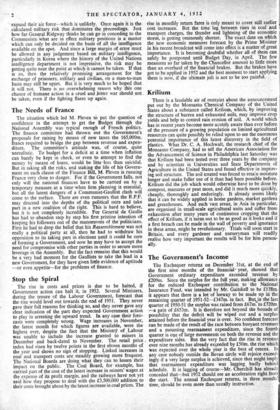Stop the Spiral
The rise in costs and prices is due to be halted, if Government action can halt it, in 1952. Several Ministers, during the tenure of the Labour Government, forecast that the rise would level out towards the end of 1951. They never gave their full reasons for thinking so, and they never gave any clear indication of the part they expected Government action to play in arresting the upward trend. In any case their fore- casts were completely wrong. Wage increases in November, the latest month for which figures are available, were the highest ever, despite the fact that the Ministry of Labour was unable to include the increase granted to miners in December and back-dated to November. The retail price index had risen by twelve points in the first eleven months of the year and shows no sign of stopping. Linked increases in coal and transport costs are steadily growing more frequent. The National Boards are doing what they can to lessen their impact on the public. The Coal Board, for example, has carried part of the cost of the latest increase in miners' wages at the expense of its profit margin, and the railways have not yet said how they propose to deal with the £3,500,000 addition to their costs brought about by the latest increase in coal prices. The rise in monthly return fares is only meant to cover still earlier cost increases. But the time lag between rises in coal and transport charges, the thunder and lightning of the economic storm, is getting ominously shorter. The exact date on which the new economic measures forecast by the Prime Minister in his recent broadcast will come into effect is a matter of great importance. It is becoming doubtful whether all of them can safely be postponed until Budget Day, in April. The few measures so far taken by the Chancellor amount to little more than an overhaul of the financial brakes. But the brakes have got to be applied in 1952 and the best moment to start applying them is now, if the ultimate jolt is not to be too painful.






































 Previous page
Previous page